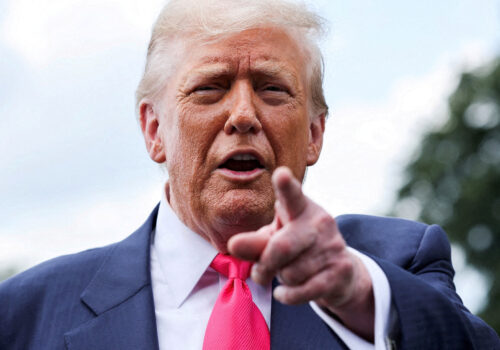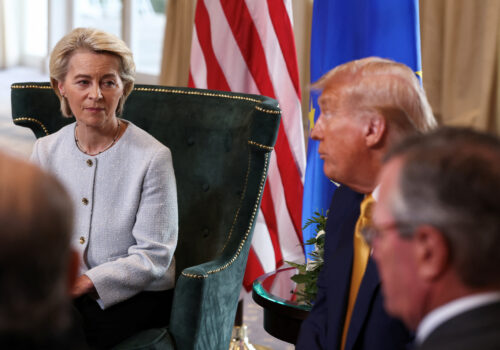Trump’s review of US membership in the IMF offers a rare chance for reform
As the International Monetary Fund (IMF) and the World Bank prepare for their summer recess, their employees’ minds will not be far from what is happening during their absence in Washington. The two institutions are entering a critical period over the coming weeks, awaiting the outcome of the Trump administration’s review of US membership in international organizations this month. The Republican Party’s isolationist wing would certainly relish a decision by the president to withdraw from the international lenders. But there are also moderate voices within the administration, notably Treasury Secretary Scott Bessent, who struck a supportive line in a speech earlier this year.
Given their large war chest to fight financial crises, leveraging US contributions by a ratio of five to one, it remains unlikely that the United States will withdraw from the institutions it was critical in founding eighty years ago. However, it would also be surprising if the White House does not try to extract some major concessions from the multilateral lenders, prompting insider talk of the Bretton Woods institutions facing their own multilateral “liberation day.”
In late July, the IMF announced that Gita Gopinath, the IMF’s first deputy managing director, is stepping down at the end of August. Whether coincidental or not, her exit should be seen in this context, even if it would be in line with the long-standing tradition that new US administrations appoint their own management representatives at the IMF. Unlike at the World Bank, where a US candidate for the presidency requires confirmation by the executive board, the choice of first deputy is for the IMF’s managing director to make and doesn’t require formal board approval.
It has been rare—but not unheard of—that the head of the IMF would resist a call for change or a specific candidate proposed by the IMF’s largest shareholder. In the current situation, it seems safe to assume that Managing Director Kristalina Georgieva will follow through on an appointment proposed by the US administration. However, any speculation that this would herald a major reorientation of the IMF’s work is premature.
There are two reasons for that. First, the allocation of work within the institution’s management body lies solely in the managing director’s discretion. Georgieva could therefore accept a US appointee with a more constrained view of what the IMF should be doing but divide responsibilities in a way that would leave her first deputy in charge of minor portfolios. Gopinath’s replacement could therefore find his or her mandate quite constrained, providing little room to initiate meaningful change.
Second, Georgieva has certainly been the face of the IMF’s reorientation toward low-income and climate work in recent years. But it would have been impossible for her to spearhead this transition without the support of France and similarly minded European shareholders. These countries were instrumental in supporting her as the EU’s candidate in 2019 and extending her term in 2024. By contrast, some of the IMF’s largest financial contributors, including Japan and Germany, have become less effective in recent years to keep the IMF focused on its core expertise. Therefore, even with a strong first deputy managing director in place, the United States would not necessarily have the votes to secure changes in how the institution currently works.
To the supporters of the IMF’s new course, this might provide the basis for an acceptable deal with the United States. Some sacrifices might be required to satisfy multilateral hawks in the US administration, such as terminating the Resilience and Sustainability Trust, a resource-intensive lending program with little impact. But many shareholders will cling to the hope that, once an agreement has been struck, the work of the institution might proceed largely along established tracks.
Perhaps they are right. Previous administrations were also critical of the IMF’s work but settled for minor concessions that proved short-lived. For example, when global current account imbalances first emerged in the 1990s, the IMF embarked on a complex process to brand countries with “fundamentally misaligned” exchange rates, which failed spectacularly and was abandoned a few years later. Another example, following the 2010 Greece program, was a US push for tying larger loan programs to a higher standard for debt sustainability. However, this has not stopped the fund from engaging in de-facto evergreening its loans—that is, extending fresh loans to ensure its own repayment—to Argentina, Egypt, and a host of developing countries.
Failing to deliver on core US demands would be a dangerous strategy, however. The IMF has a number of difficult problems at hand with the potential to undermine both its reputation and its financial position. Should these problems worsen, they could play right in the hands of its critics within an administration that is known for changing positions with very short notice.
- For example, the Argentina program has been a success so far, due to ruthless cost-cutting on the part of the Milei administration, but the country’s difficulties in accumulating foreign exchange reserves are a sign of the politically thin ice on which the program is resting.
- Second, in Ukraine, curbing the independence of the country’s anti-corruption agencies would have been a major blow to the IMF, which spent a good deal of the 2010s working to have these institutions established. Although Ukrainian President Volodymyr Zelenskyy has now backtracked on his earlier decision, goodwill for this extraordinarily risky program is under threat after another report of large-scale corruption in the armed forces.
- Third, while the recent External Sector Report has finally taken a more critical view of China’s manufacturing policies, it is still being criticized for glossing over large current account imbalances that are central to the White House’s policy agenda.
- And finally, by extending loans to low-income countries without insisting on debt restructuring and more stringent conditionality, the IMF is setting itself up for another debt forgiveness campaign, which had detrimental effects on the institution’s finances and operational effectiveness after it came to pass in the early 2000s.
Rather than trying to get away with only a modicum of change, liberal-minded shareholders would therefore be well advised to work with moderate forces within the administration to secure a fundamental turnaround of the institution. To deal with the disruption from global fragmentation, higher trade barriers, and the ascent of stablecoins and related monetary instruments, there is a desperate need for tighter surveillance and innovative policy proposals in the IMF’s core areas.
With the Federal Reserve increasingly being politicized and subject to management scrutiny, it is even more important for the IMF to guide policymakers through a generational shift in the global economic environment. The institution needs its major shareholders aligned to tackle new challenges, and it deserves a management team qualified to lead it on this new path.
Martin Mühleisen is a nonresident senior fellow at the Atlantic Council’s GeoEconomics Center and a former IMF official with decades of experience in economic crisis management and financial diplomacy.
Further reading
Fri, Aug 1, 2025
How Donald Trump remade global trade
New Atlanticist By Josh Lipsky
The US president has smashed the system, but the speed and scale of the smashing owes to a system that had been growing increasingly brittle for years.
Thu, Jul 31, 2025
Beijing extends and pretends to deal with its mountain of local government debt
Econographics By Jeremy Mark
Beijing's three-year local debt restructuring plan fails to actually address the trillions of dollars weighing on local governments and will only cause greater problems down the road.
Sun, Jul 27, 2025
How big a deal is the new US-EU trade announcement?
Fast Thinking By
Our experts unpack the framework for a trade deal announced by US President Donald Trump and European Commission President Ursula von der Leyen on Sunday in Scotland.
Image: Bangko Sentral ng Pilipinas (BSP) Governor Eli Remolona, Deputy Managing Director of the International Monetary Fund (IMF) Gita Gopinath, Governor of the South African Reserve Bank Lesetja Kganyago, and former Reserve Bank of India governor Raghuram Rajan, speak during a press briefing at the 2025 annual IMF/World Bank Spring Meetings in Washington, D.C., U.S., April 25, 2025. REUTERS/Ken Cedeno


